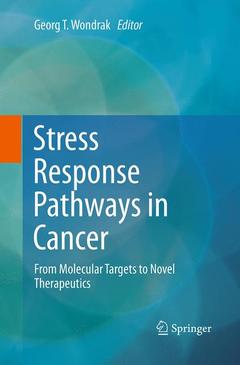Description
Stress Response Pathways in Cancer, 2015
From Molecular Targets to Novel Therapeutics
Coordinator: Wondrak Georg T.
Language: English
Subjects for Stress Response Pathways in Cancer:
Stress Response Pathways in Cancer
Publication date: 09-2016
Support: Print on demand
Publication date: 09-2016
Support: Print on demand
Stress Response Pathways in Cancer
Publication date: 11-2014
446 p. · 15.5x23.5 cm · Hardback
Publication date: 11-2014
446 p. · 15.5x23.5 cm · Hardback
Description
/li>Contents
/li>Comment
/li>
It is now established that dysregulated cell stress response pathways play a critical role in tumorigenesis, and a refined mechanistic understanding of this phenomenon at the molecular level promises to open new avenues for targeted therapeutic strategies that may benefit cancer patients in the near future. Coauthored by recognized leaders in cancer research from five continents, this novel book provides a comprehensive perspective on cell stress response pathways and therapeutic opportunities. Focusing on the role of genotoxic, proteotoxic, oxidative, metabolic, and inflammatory stress in tumorigenesis, the book is essential reading for students, basic researchers, and biomedical health care professionals interested in cancer and therapeutic development.
Preface.- Introduction to cell stress responses in cancer: The big picture.- DNA repair dysregulation in cancer: From molecular mechanisms to synthetic-lethal opportunities.- Cell cycle checkpoint defects as anticancer targets: From molecular mechanisms to therapeutic opportunities.- p53 at the crossroads between stress response signaling and tumorigenesis: From molecular mechanisms to therapeutic opportunities.- Sirtuins as a double-edged sword in cancer: From molecular mechanisms to therapeutic opportunities.- MicroRNA regulated stress responses in cancer.- Senescence in oncogenesis: From molecular mechanisms to therapeutic opportunities.- Pro-senescence therapy for cancer: time for the clinic.- Integrating proteotoxic stress response pathways for induction of cell death in cancer cells: molecular mechanisms and opportunities.- The Hsp70 family of heat shock proteins in tumorigenesis: From molecular mechanisms to therapeutic opportunities.- The ubiquitin-proteasome system (UPS) as a cancer drug target: Emerging mechanisms and therapeutics.- Endoplasmatic reticulum stress in multiple myeloma: From molecular mechanisms to therapeutic opportunities.- Melanomagenic gene alterations viewed from a redox perspective: Molecular mechanisms and therapeutic opportunities.- Targeting hypoxic adaptations of cancer cells: Molecular mechanisms and therapeutic opportunities.- Targeting glycolytic adaptations of cancer cells: from molecular mechanisms to therapeutic opportunities.- At the crossroads between mitochondrial metabolite transport and apoptosis: VDAC1 as an emerging cancer drug target.- Inflammatory dysregulation and cancer: From molecular mechanisms to therapeutic opportunities.- Cell-nonautonomous ER stress-mediated dysregulation of immunity by cancer cells.- Index.
The book covers very recent research that promises to revolutionize cancer-directed chemotherapeutic interventions The book provides a unique translational coverage between molecular cancer biology and cancer-directed therapeutic development The book provides state-of-the-art coverage written by recognized experts from five continents Includes supplementary material: sn.pub/extras
© 2024 LAVOISIER S.A.S.




